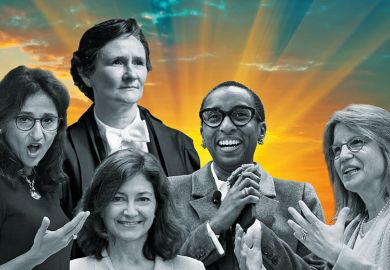Female lecturers in the sciences are more likely than their male counterparts to share potentially stigmatising personal details with their undergraduate students, a US survey has found, highlighting a potential pathway for growing gains in equity.
The survey – covering more than 2,000 academics in the sciences at the nearly 150 top-ranked US research institutions – suggests that the female faculty are trying to provide their students with positive models in their male-dominated field, even while they feel some personal risk in doing so, according to its authors at Arizona State University.
“They perceive greater stigma associated with these identities, and even then, they still reveal them more,” said Sara Brownell, an ASU professor of life sciences and one of the three authors of the paper in Plos One.
The authors drafted a list of eight “concealable stigmatised identities” for their analysis: LGBTQ+ status; depression; anxiety; struggling academically; growing up in a low-income household; transferring from a two-year institution; being a first-generation college student; and having a disability.
They found that female faculty were one and a half times more likely than men to reveal at least one of those identities to at least some students. The women shared more often in cases of depression, growing up in a low-income household, or being a first-generation college student. The women also were more likely than the men to rate the identities as socially stigmatising.
Professor Brownell and her ASU co-authors – Katelyn Cooper and Carly Busch – pursued the work as a way of illustrating a potentially potent avenue for helping more people from under-represented backgrounds succeed in the sciences. For students struggling with one of the identities in their own personal background, Professor Brownell said, “you may not be able to see yourself as a future scientist, or as a future professor, unless someone shares that”.
Some academics in the survey described fears of repercussions for sharing such personal information, such as receiving negative teaching evaluations or possibly getting fired, Professor Brownell said. Yet the truth, she said, is that faculty at most US institutions are legally protected from being fired for such disclosures, while data from other studies suggest that penalties in evaluations are unlikely.
On the contrary, she said, universities might want to do more to encourage such sharing, and guide academics in how to do it most effectively.
The Plos study did not delve into details of how the faculty raised the topic with their students, although it found that the gender difference in the proportion of academics who revealed personal details to their students existed only in cases where the instructor shared the information with only some of their students. Among those faculty who shared information with all students, there was no gender divide, Professor Brownell said.
Register to continue
Why register?
- Registration is free and only takes a moment
- Once registered, you can read 3 articles a month
- Sign up for our newsletter
Subscribe
Or subscribe for unlimited access to:
- Unlimited access to news, views, insights & reviews
- Digital editions
- Digital access to THE’s university and college rankings analysis
Already registered or a current subscriber?










